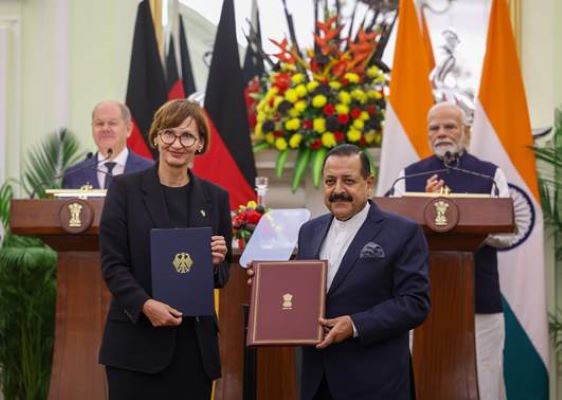Both Ministers also discussed potential collaboration in hydrogen energy

In a significant step to advance Indo-German cooperation in science and technology, Union Minister Dr. Jitendra Singh and German Federal Minister Bettina Stark-Watzinger exchanged a joint declaration of Intent for cooperation in research and development on advanced materials with commitment to seek mutual dividends.
The exchange, held in the presence of Prime Minister Narendra Modi, underscores both nations’ commitment to fostering cutting-edge research that will drive innovation and address global challenges.
The bilateral talks between Dr. Jitendra Singh and Stark-Watzinger, which took place prior to the Plenary between two heads of state, were a pivotal part of the golden jubilee celebration of the Indo-German science and technology collaboration.
During the meeting, Dr. Jitendra Singh expressed gratitude to Stark-Watzinger for her consistent support in strengthening the Indo-German partnership. He highlighted recent collaborative successes, such as the launch of 2+2 joint projects in areas like “Waste to Wealth” and sustainable packaging, as well as a new call for proposals in AI for Sustainability.
These initiatives, along with the Joint Declaration of Intent, will be presented as key outcomes at the upcoming Indo-German Inter-Governmental Consultations led by the Prime Minister of India and the German Chancellor, said the Minister.
Dr. Jitendra Singh also lauded the Indo-German Science and Technology Centre (IGSTC) for its instrumental role in promoting joint research, having supported over 50 projects and connected young researchers from both nations. Discussions included the recent establishment of the International Research Training Group (IRTG) between IISER Trivandrum and Würzburg University, focusing on photoluminescence in supramolecular matrices, a testament to the advanced, collaborative research being fostered between the two countries.
Additionally, Dr. Jitendra Singh reaffirmed India’s commitment to long-term international projects such as the Facility for Antiproton and Ion Research (FAIR) in Darmstadt, where Indian scientists play a key role in advanced materials and particle physics research.
The bilateral discussions also highlighted national initiatives such as India’s Anusandhan National Research Foundation (ANRF) and the National Quantum Mission, both aimed at scaling up R&D across priority areas including electric mobility, sustainable agriculture, and advanced materials.
The two ministers also discussed potential collaboration in hydrogen energy, with Dr. Jitendra Singh noting that India’s National Hydrogen Mission could offer promising joint opportunities in R&D, production, and sustainable energy storage.
As the meeting concluded, Dr. Jitendra Singh and Stark-Watzinger affirmed their commitment to aligning innovation and research efforts across areas such as biotechnology, environmental technology, and healthcare. Both leaders emphasized the importance of fostering academic exchange and talent development, ensuring that the Indo-German partnership continues to drive innovative solutions for a sustainable and resilient global future.
Subscribe to our newsletter & stay updated.